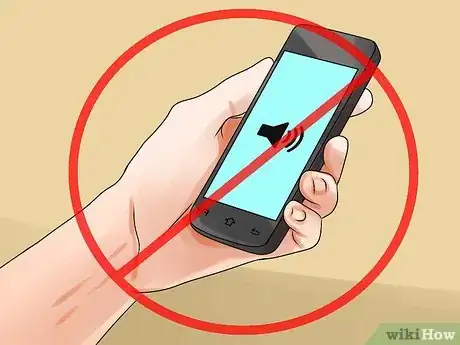This article was co-authored by Jessica Swenson. Dr. Jessica Swenson is a Community Psychologist & Licensed Clinical Therapist and the Founder of Transformative Growth Counseling. With over 10 years of experience, she specializes in relationships—both romantic and familial. She earned her PhD in Community Psychology from National Louis University and her MS in Clinical Psychology from Roosevelt University. She’s also a Certified Clinical Trauma Professional.
There are 7 references cited in this article, which can be found at the bottom of the page.
This article has been viewed 75,185 times.
On average, teens send three thousand texts per month. Because of their raging hormones and curiosity to explore their sexuality, many teens engage in sexting, or sending suggestive messages or photos in a text message. In fact, studies have shown that a significant number of teens have sent sexually suggestive images of themselves or others. By deterring your teen from sexting and getting her to recognize the consequences, you may be able to prevent a potential issue in the future—for yourself or your teen.
Steps
Deterring Your Teen from Sexting
-
1Maintain an open line of communication. Keep an active interest in your teen’s life by encouraging open and honest conversations. This can help build mutual trust and may help you identify cases of sexting involving your teen.[1]
-
2Initiate conversations about sexting. Because sexting is such a sensitive and possibly embarrassing topic for your teen, do not approach it in an accusatory or hostile manner. Start by talking about something else first and then transition into a conversation about your teen’s exposure to or involvement in sexting. [2]
- For example, you might want to ask “How is your biology class going? Have you learned anything cool lately?” Keep the conversation light to help relax your teen. Then you could say “did they talk to you at school about the recent sexting scandal?”
- Make sure to weave into the conversation the reasons for how and why sexting is wrong.
Advertisement -
3Understand your teen’s perspective. While it may seem obvious to you that sexting is wrong, your teen may not agree or not fully understand why. In an age where texts, e-mails, pictures, Tweets, blogs, and everything in between are constantly sent and received, the serious nature of sexting may be lost in the shuffle.[3] In addition, she may be sexting as an impulsive behavior, because she is being blackmailed, or because she thinks it’s harmless flirting. [4]
- Being open to your teen at any time can do wonders with helping her trust and confide in you about possible sexting.[5]
- For example, you can say, “I know a lot of kids are doing this and I really understand that it’s considered a normal part of being on social media, but I want you to understand that I’m looking out for your well-being right now and down the road.”
- If you are monitoring your teen’s web usage, which is a significant part of most teens’ lives, it’s also important that you be honest with her about this so that she doesn’t feel unduly threatened. You could say “I’m putting this monitor on the computer to protect you from anyone that may be sending you or try to send you inappropriate material.”
-
4Establish time limits on device usage. Consider setting time limits for Internet and cell phone use. [6] This may keep your teen from indulging in sexting for other types of online engagement.[7]
- You may not feel your teen is not responsible enough for a smartphone with camera and Internet capability, so give her a basic cell phone on which she can make calls and send text messages without images. Be aware that this will make you unpopular with your teen, but allowing her to prove she can be responsible may help prevent her from sexting in the long run.
- Your cellular and data provider may be able to set limits that your teen cannot control from your home. Ask the respective company if this is an option for you.
- In some cases, you can set restrictions on certain apps and features on smartphones. Most smartphones have information on establishing restrictions readily available online.[8]
-
5Monitor computers and devices. Place your family’s communal computers in a public area of your home, such as the living room or kitchen. Make sure your children know that you monitor their devices for what websites they are viewing, which may help prevent them from curiously looking up sexting or engaging in it online. [9]
- Know which social media sites your teen uses and have a policy about her online “friends” to show her not only that you care, but that you won’t tolerate any sexting or similar behaviors.[10]
- Have a strategy for monitoring your teen’s devices. For example, you can tell your teen that you will check her device every day for browsing history (be aware that they can use incognito or delete their history).[11]
- Make sure to check chat logs, emails, files, and social networking sites for inappropriate content from friends or strangers.[12]
- Consider setting up your own social media profile, which may help deter sexting. This is one of the most effective ways at helping to control such behavior.[13]
- Be aware that even if you are vigilant about monitoring your teen’s devices, she can still delete potentially problematic content.
-
6Obtain monitoring software. Install monitoring software on your teen’s and family devices which can track different types of content including images. [14] This may further deter your teen from sexting or inviting unwanted attention. You can get monitoring software from a variety of sources including:[15]
- Commercially-available programs.
- Your Internet provider.
- Downloads from your computer or device.
- Parental controls available on computers and devices.[16]
- Use this software as often as you deem necessary or whenever you receive a warning message.
-
7Collect devices at teen gatherings. Studies have shown that peer pressure, especially at parties, can contribute to sexting. Gathering the devices at parties or other events may help deter your teen and her friends from sexting or other suggestive behavior. [17]
- Realize that taking away devices may make you very unpopular with your child and may have consequences for her from her friends. Try offering alternatives such as giving them disposable cameras for fun.
-
8Offer your teen other activities. If your teen has a boyfriend, offer her other activities that can serve as an alternative to sexting. Introduce her to social media that can highlight her cooking skills or something that doesn’t objectify her. You could offer to take beautiful pictures of her that she can post or send to her friends or boyfriend. [18]
- Try and keep your teen active and engaged. Boredom may lead to increased web use, thereby creating temptation to take part in suggestive behaviors.
- Don’t repress your teen’s natural curiosity about sex. Not talking to her about sex, sexting and their consequences may make her more likely to engage in these behaviors.
-
9Speak with other parents and school officials. Just as maintaining open communication with your teen is important, it’s also vital to stay in contact with other parents and school officials. This can alert you to potential problems and help your teen proactively deal with any negative situations. [19]
- Your school may have an alert system in place to inform parents about issues related to sexting.
- Meeting your teen’s friends’ parents occasionally may also help you identify potential problems.
Recognizing Potential Consequences
-
1Learn about technology. One of the most effective ways to deter sexting and help your child recognize the potential consequences of it is to learn about the various technology kids are using. Consider exploring the Internet yourself or taking a class that may give you useful information. [20]
- You may want to keep your teen a part of your learning technology. Ask her to teach you about social media or other sites she uses frequently.
- If you do “friend” your teen on social media, don’t be a nuisance by stalking her or maintaining a very visible presence. This may embarrass her and cause problems with her friends that are otherwise avoidable.
-
2Remind your teen that sexting is illegal. As a part of openly communicating with your teen, emphasize that taking and sending nude pictures or videos of anyone can be a serious offense. [21] You may want to draw upon examples from the media or even have a lawyer or law enforcement officer speak to her to help her understand the gravity of sexting.[22]
- In many sexting cases, teens have been convicted of felony charges for the production, possession or distribution of child pornography or pornography even if the person is over 18.
- Make sure your teen is aware that any person involved in sexting with her may be legally culpable for any images sent or received. This also includes you as the owner of the device.[23]
-
3Explain non-legal consequences. In addition to letting your teen know about the possible legal action that can come as a result of sexting, make her aware that there are also other uncomfortable consequences of sexting. If she knows that her emotional health or reputation may be damaged, she may be less likely to sext. [24]
- Talk to your teen about the ways in which any person with whom she shares the photos could circulate or post what she thought was an innocent photo on the Internet. Tell her this could hurt and make her feel violated knowing that many people have seen the most intimate side of her.[25]
- Tell her that sexting and possible circulation could severely damage her reputation or prevent her from getting a job or even getting into the college of her choice.
- Advise your teen that if he is convicted of a sex crime, that his name may end up on the sexual offender registry for the rest of his life.[26]
- Make your teen aware that sexting could also result in expulsion from school, sports teams, or other activities in which she participates.[27]
-
4Impose consequences for non-compliance. Make sure your teen knows that you will impose consequences for sexting if you catch her, even if there is no law enforcement involved. You can punish her through means such as confiscation of her cell phone or grounding. [28]
- You can forbid your teen from attending school activities or going out with friends, especially if they were involved in any sexting.
- Keep the consequences commensurate with the infraction. For example, if your teen sent suggestive photos that don’t contain nudity, you could simply place restrictions on the phone. However, if the images border on pornographic, you may want to confiscate the phone altogether and ground her.
- Make sure your teen understands why you’ve imposed the consequences you have and ways in which she can rebuild your trust.
Expert Q&A
-
QuestionHow can I talk to my younger teen about why sexting isn't okay? How can I get them to see why it's dangerous and wrong?
 Kathy Slattengren, M.Ed.Kathy Slattengren is a Parent Educator and Coach and the Founder of Priceless Parenting. With over two decades of experience, Kathy specializes in helping parents build strong, loving relationships with their children. She has helped thousands of parents around the world through Priceless Parenting's online classes, presentations, coaching, and books. Kathy holds a Bachelor's degree in Computer Science and Psychology from The University of Minnesota and a Masters degree in Education and Instructional Design from The University of Washington. Kathy is a member of the National Parenting Education Network, the US Alliance to End the Hitting of Children, the International Society for Technology in Education, and a founding member of Parent Learning Link. Priceless Parenting has been featured on ABC News, Komo News, King 5 News, National PTA, Parent Map, and Inspire Me Today.
Kathy Slattengren, M.Ed.Kathy Slattengren is a Parent Educator and Coach and the Founder of Priceless Parenting. With over two decades of experience, Kathy specializes in helping parents build strong, loving relationships with their children. She has helped thousands of parents around the world through Priceless Parenting's online classes, presentations, coaching, and books. Kathy holds a Bachelor's degree in Computer Science and Psychology from The University of Minnesota and a Masters degree in Education and Instructional Design from The University of Washington. Kathy is a member of the National Parenting Education Network, the US Alliance to End the Hitting of Children, the International Society for Technology in Education, and a founding member of Parent Learning Link. Priceless Parenting has been featured on ABC News, Komo News, King 5 News, National PTA, Parent Map, and Inspire Me Today.
Parent Educator & Coach Talk to them about family's values. Ask them, "What are the values that guide your choices?" From there, you can work through why it may not be appropriate for underage children to be sending sexually explicit messages. From there, you can explain why it might be potentially dangerous to be engaging with someone like that. Just get a dialogue started.
Talk to them about family's values. Ask them, "What are the values that guide your choices?" From there, you can work through why it may not be appropriate for underage children to be sending sexually explicit messages. From there, you can explain why it might be potentially dangerous to be engaging with someone like that. Just get a dialogue started. -
QuestionWhen should I talk to my child about sexting?
 Kathy Slattengren, M.Ed.Kathy Slattengren is a Parent Educator and Coach and the Founder of Priceless Parenting. With over two decades of experience, Kathy specializes in helping parents build strong, loving relationships with their children. She has helped thousands of parents around the world through Priceless Parenting's online classes, presentations, coaching, and books. Kathy holds a Bachelor's degree in Computer Science and Psychology from The University of Minnesota and a Masters degree in Education and Instructional Design from The University of Washington. Kathy is a member of the National Parenting Education Network, the US Alliance to End the Hitting of Children, the International Society for Technology in Education, and a founding member of Parent Learning Link. Priceless Parenting has been featured on ABC News, Komo News, King 5 News, National PTA, Parent Map, and Inspire Me Today.
Kathy Slattengren, M.Ed.Kathy Slattengren is a Parent Educator and Coach and the Founder of Priceless Parenting. With over two decades of experience, Kathy specializes in helping parents build strong, loving relationships with their children. She has helped thousands of parents around the world through Priceless Parenting's online classes, presentations, coaching, and books. Kathy holds a Bachelor's degree in Computer Science and Psychology from The University of Minnesota and a Masters degree in Education and Instructional Design from The University of Washington. Kathy is a member of the National Parenting Education Network, the US Alliance to End the Hitting of Children, the International Society for Technology in Education, and a founding member of Parent Learning Link. Priceless Parenting has been featured on ABC News, Komo News, King 5 News, National PTA, Parent Map, and Inspire Me Today.
Parent Educator & Coach The earlier you bring something like this up, the better it will generally be. If they've got a cell phone, it's worth sitting them down and talking about the potential risks and dangers.
The earlier you bring something like this up, the better it will generally be. If they've got a cell phone, it's worth sitting them down and talking about the potential risks and dangers. -
QuestionWhat's the definition of the word sexting?
 RubyTop AnswererThe definition of sext is "send (someone) sexually explicit photographs or messages via mobile phone."
RubyTop AnswererThe definition of sext is "send (someone) sexually explicit photographs or messages via mobile phone."
Warnings
- Sexting photos or videos of underage teens is considered child pornography, whether it is producing, possessing or distributing the photos or videos.⧼thumbs_response⧽
References
- ↑ https://www.aap.org/en-us/about-the-aap/aap-press-room/news-features-and-safety-tips/pages/Talking-to-Kids-and-Teens-About-Social-Media-and-Sexting.aspx
- ↑ http://www.connectsafely.org/pdfs/sexting_tips.pdf
- ↑ http://www.connectsafely.org/pdfs/sexting_tips.pdf
- ↑ http://www.connectsafely.org/pdfs/sexting_tips.pdf
- ↑ http://www.connectsafely.org/pdfs/sexting_tips.pdf
- ↑ https://www.aap.org/en-us/about-the-aap/aap-press-room/news-features-and-safety-tips/pages/Talking-to-Kids-and-Teens-About-Social-Media-and-Sexting.aspx
- ↑ https://www.aap.org/en-us/about-the-aap/aap-press-room/news-features-and-safety-tips/pages/Talking-to-Kids-and-Teens-About-Social-Media-and-Sexting.aspx
- ↑ https://support.apple.com/en-us/HT201304
- ↑ http://www.connectsafely.org/pdfs/sexting_tips.pdf
- ↑ http://www.connectsafely.org/pdfs/sexting_tips.pdf
- ↑ https://www.aap.org/en-us/about-the-aap/aap-press-room/news-features-and-safety-tips/pages/Talking-to-Kids-and-Teens-About-Social-Media-and-Sexting.aspx
- ↑ https://www.aap.org/en-us/about-the-aap/aap-press-room/news-features-and-safety-tips/pages/Talking-to-Kids-and-Teens-About-Social-Media-and-Sexting.aspx
- ↑ https://www.aap.org/en-us/about-the-aap/aap-press-room/news-features-and-safety-tips/pages/Talking-to-Kids-and-Teens-About-Social-Media-and-Sexting.aspx
- ↑ https://www.aap.org/en-us/about-the-aap/aap-press-room/news-features-and-safety-tips/pages/Talking-to-Kids-and-Teens-About-Social-Media-and-Sexting.aspx
- ↑ https://www.aap.org/en-us/about-the-aap/aap-press-room/news-features-and-safety-tips/pages/Talking-to-Kids-and-Teens-About-Social-Media-and-Sexting.aspx
- ↑ https://www.aap.org/en-us/about-the-aap/aap-press-room/news-features-and-safety-tips/pages/Talking-to-Kids-and-Teens-About-Social-Media-and-Sexting.aspx
- ↑ https://www.aap.org/en-us/about-the-aap/aap-press-room/news-features-and-safety-tips/pages/Talking-to-Kids-and-Teens-About-Social-Media-and-Sexting.aspx
- ↑ https://www.aap.org/en-us/about-the-aap/aap-press-room/news-features-and-safety-tips/pages/Talking-to-Kids-and-Teens-About-Social-Media-and-Sexting.aspx
- ↑ https://www.aap.org/en-us/about-the-aap/aap-press-room/news-features-and-safety-tips/pages/Talking-to-Kids-and-Teens-About-Social-Media-and-Sexting.aspx
- ↑ https://www.aap.org/en-us/about-the-aap/aap-press-room/news-features-and-safety-tips/pages/Talking-to-Kids-and-Teens-About-Social-Media-and-Sexting.aspx
- ↑ https://www.aap.org/en-us/about-the-aap/aap-press-room/news-features-and-safety-tips/pages/Talking-to-Kids-and-Teens-About-Social-Media-and-Sexting.aspx
- ↑ https://www.aap.org/en-us/about-the-aap/aap-press-room/news-features-and-safety-tips/pages/Talking-to-Kids-and-Teens-About-Social-Media-and-Sexting.aspx
- ↑ http://www.connectsafely.org/pdfs/sexting_tips.pdf
- ↑ http://www.connectsafely.org/pdfs/sexting_tips.pdf
- ↑ http://www.connectsafely.org/pdfs/sexting_tips.pdf
- ↑ http://edition.cnn.com/2009/CRIME/04/07/sexting.busts/
- ↑ http://www.connectsafely.org/pdfs/sexting_tips.pdf
- ↑ http://www.connectsafely.org/pdfs/sexting_tips.pdf




















-Step-19-Version-3.webp)



















































